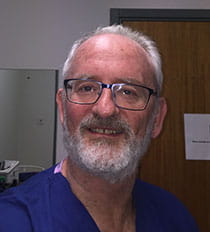Consultant Surgeon Case Study
We spoke to Keith Poskitt, a Consultant Surgeon, about how the Surgical Care Team works in his Trust.

A brief summary of local Surgical Care Team roles
The Surgical Care Team in Cheltenham started to develop in 1995 with expansion of the number of consultants with no possibility of employing more junior doctors. In addition to the introduction of two Specialty Nurses for leg ulcer care, an Advanced Nurse Practitioner (ANP) was introduced to the vascular unit to work alongside the house surgeon to support inpatient management. Continued restriction of deanery posts at Core and Specialty level required an innovative change to the clinical team to deal with the expanding unit and in early 2000, two Surgeons’ Assistants, subsequently renamed Surgical Care Practitioners (SCPs), were appointed to work primarily in theatre with additional clinic responsibilities. Additional ANPs were introduced to the vascular department to support decreasing numbers of foundation doctors and following reconfiguration of vascular services to Cheltenham, a total of six ANPs are now in post to support inpatient care at both the Hub and Spokes hospitals. The three Surgical Care Practitioners in post provide expertise in theatre and clinic and are pivotal in providing treatment of venous dysfunction in patients with chronic venous ulceration. Both Specialty Ulcer Nurses and SCPs work collaboratively to treat leg ulcers using an evidence-based, vascular-led clinical care pathway. We are working to improve leg ulcer care both locally and nationally with a vision to improve the quality and cost-effectiveness of ulcer services.
How have surgical care team roles supported patient care, the service, and the team?
Surgical care has been enhanced in the three clinical areas of care with ANPs in the ward environment, SCPs primarily in theatre and Specialist Ulcer Nurses in the clinic setting. We have found that these roles have allowed career progression for capable individuals with ANPs progressing from a ward setting and SCPs from a theatre setting. Both ANPs and SCPs are able to enhance the patient journey by providing continuity throughout the full cycle of care as an inpatient or operative case and then as an outpatient. Our experience has shown these two roles improve the patient experience and safety, enhance the consent process, improve both communication and efficiency while providing reassurance. A contact phone number provided to patients allows patients to contact the clinical team rather than the General Practitioner.
Do you have any tips for how others can implement this model of care?
The success of these roles is dependent on enthusiastic consultant surgeons’ delivering educational support and mentorship. This emphasis on surgical education stems from the surgical nature of these new clinical roles and it is important to understand that these roles do not follow conventional nursing positions. To ensure safety, the responsible surgeon has to provide supervision with regular assessment of surgical competences/standards and ensuring Continued Professional Development in a similar way to surgical training. Accordingly, as setting targets, competencies and safety guidelines are key to the progress of these roles, it is essential that the responsible surgeon provides both the educational and line management support for these posts. Variation of this management structure can impede success of such models of care.
What are the benefits of having a Surgical Care Team in the Trust?
Surgical care teams provide greater continuity for both surgeons and patients thereby enhancing patient safety at times when junior doctors are limited. Furthermore, they help provide stability in the clinical areas which facilitates educational and training opportunities for foundation doctors, CTs and STs. Patients have embraced these roles as they this team provide a familiar face to complete the patient journey and provide high quality care. In our experience, the combination of ANPs, SCPs, junior doctors and consultants has proved a durable team, which has provided an efficient, satisfied unit which works effectively for the patients.
What challenges do Surgical Care Teams face?
At a time when a reduction in medical and surgical recruits is seen, it is important to recognise not only the short but the long term establishment of the ANPs and SCPs roles with appropriate regulation. To ensure patient safety and staff retention, incorporating these roles under the umbrella of the Royal College of Surgeons would help ensure that ongoing Continued Professional Development is maintained with appropriate education and training in a similar mould to surgical training. Integration of these roles alongside junior doctor training roles would enable both members to benefit. As talented individuals are to be attracted to these roles, career progression is essential and pay scales should reflect the work that is being undertaken. If these roles are performing invasive procedures and managing surgical patients then they require reimbursement accordingly (Band 6 up to 8b) and not act as an economic workforce source. Motivation and job satisfaction would be lost if progress were to be restricted.
